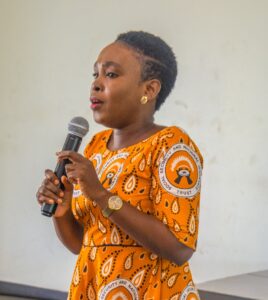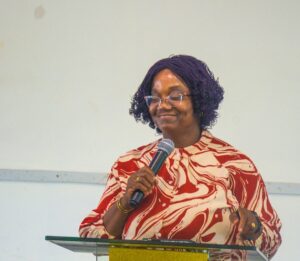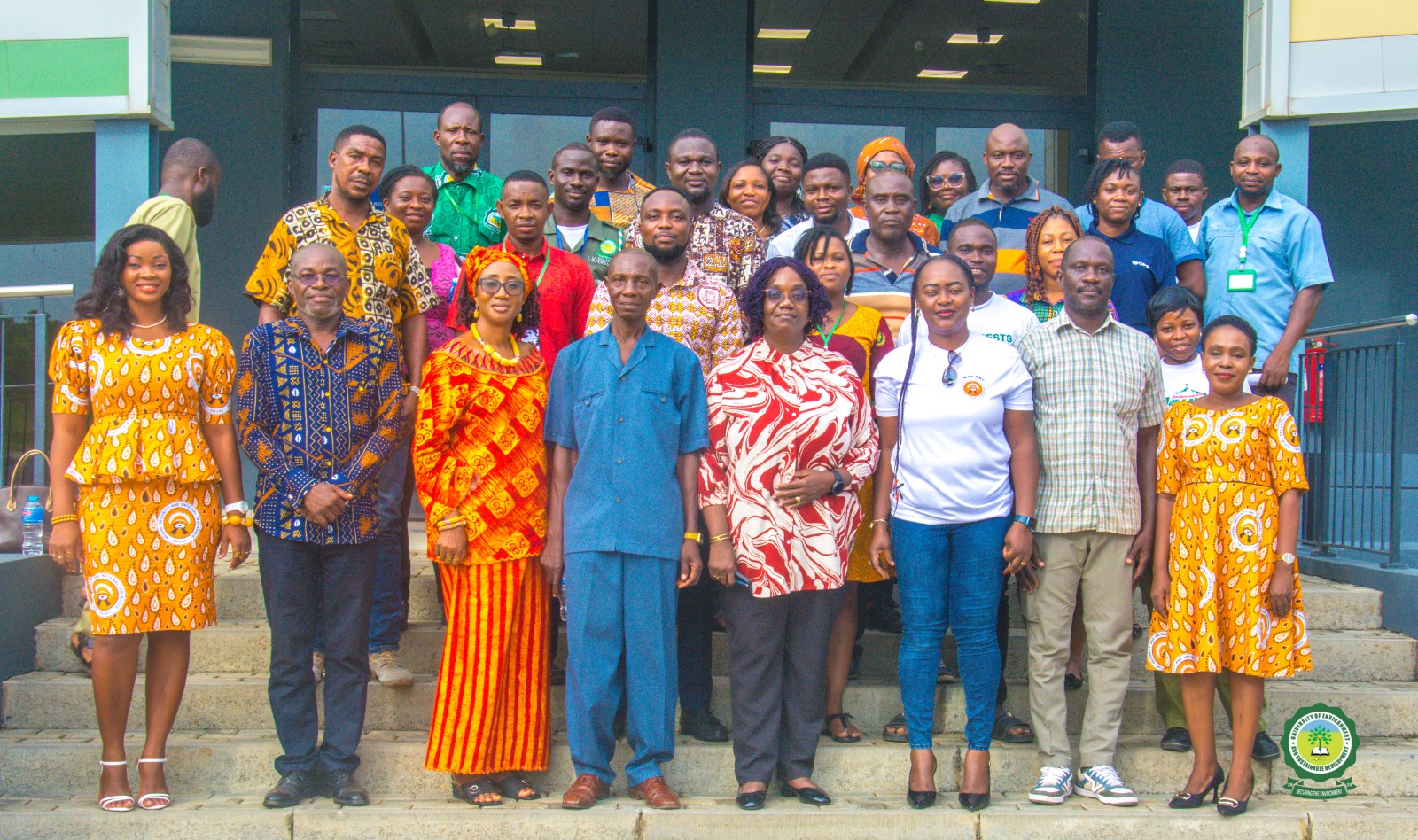The Human Resource Division of the University of Environment and Sustainable Development (UESD), Somanya, Eastern Region, is rolling out a series of training sessions aimed at improving staff welfare and enhancing productivity. One such session involved officials from the Social Security and National Insurance Trust (SSNIT), who engaged with staff members at the University’s Auditorium in the Multipurpose Building. The session focused on updating staff on key issues related to retirement, SSNIT contributions, pension packages, and other related matters.
In her presentation, the Assistant Manager of SSNIT, Somanya branch Ms. Elorm Akos Azamameti, took the participants through SSNIT’s mandate, its purpose, and its operational framework in Ghana. She reiterated that SSNIT is a government-established scheme that ensures social protection by supporting individuals financially when their income ceases upon retirement.
“This is a government-backed scheme established by an Act of Parliament,” she emphasized. “All processes and procedures carried out by SSNIT are legally sanctioned, and it’s crucial that members understand this framework.”

Ms. Azamameti explained Ghana’s three-tier pension system, governed by the National Pensions Act, 2008 (Act 766). According to her, Tier One is managed by SSNIT, while Tiers Two and Three are handled by private fund managers. Tier Three, she added, is voluntary and can be subscribed to by individuals or institutions seeking additional financial security during retirement.
On the subject of contributions, she stated that employees contribute 5.5% of their salary while employers contribute 13%, bringing the total contribution to 18.5%. She commended UESD staff members for their keen interest in their pension, noting that their active participation demonstrated a genuine desire to understand the SSNIT system and prepare adequately for retirement. Present was the Somanay branch manager, Mrs Irene Naa Djamah Ennu-Dadzie who also made contributions to queries.
In her closing remarks, the Registrar of the University, Mrs. Mary Abena Agyepong, underscored the importance of early retirement planning, urging staff to maintain accurate records and take proactive steps to secure their future.

“Retirement is inevitable,” Mrs. Agyepong noted. “Let us all make a conscious effort to ensure our SSNIT records are accurate and up to date. The University also plans to roll out a training programme to help staff understand the proper procedures for SSNIT record-keeping. “The session ended on a positive note, with staff expressing renewed commitment to understanding and optimizing their SSNIT contributions for a more secure retirement.
In a related development, a refresher workshop has been held for Secretaries and Recorders to Committees on: Memo and letter formatting and minutes writing. The facilitator for the session was Dr. Hammond Oppong Kwarteng, Deputy Registrar at UESD).
The workshop was attended primarily by Senior Members, including Junior and Assistant Registrars, as well as Senior Assistant Registrars. Dr. Oppong Kwarteng led participants through various aspects of professional correspondence, including the types and structure of memos, the standard format and procedures for writing memos from junior to senior officers, and the essential elements of formal letter writing.
He emphasised the rules governing official communication and the importance of consistency and clarity in all forms of written documentation. Special attention was given to minute-taking, which he described as the official and legal record of an organisation’s proceedings and actions.
Dr. Oppong Kwarteng explained that the responsibility of the Secretary or Recorder during meetings is to capture key points and later prepare a concise and accurate summary. He introduced participants to the standard components of minutes and the different types, particularly action minutes—also known as “decision-only minutes.” These focus on capturing decisions made and actions to be taken, and are often required at board, hearing, and council meetings.
He advised that when recording minutes, it is essential to document all decisions and action items without transcribing every spoken word. He concluded by noting that if these guidelines are properly followed, Secretaries and Recorders will find their work less challenging and more effective.
During the session, participants asked questions to clarify the rules of engagement and procedures. In her closing remarks, the Registrar, Mrs. Mary Abena Agyepong, commended Dr. Oppong Kwarteng for his insightful and practical presentation. She noted that the objective of the workshop was to improve operational efficiency among staff and to strengthen document security, which is critical in eliminating fraudulent documentation and maintaining institutional integrity.
By: Barbara M. Yakubu & Edward Twumasi Akrasi

